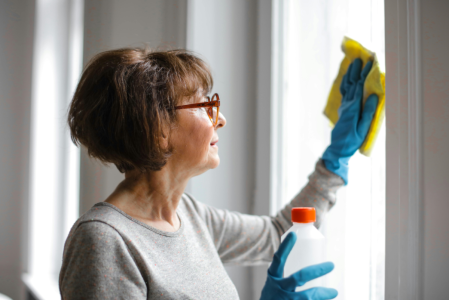Is your favourite retro cleaning trick actually making your home dirtier?
Nostalgia often brings a treasure trove of tips and tricks that have been passed down through generations. From the kitchen to the garden, these pearls of wisdom can be incredibly useful.
However, not all old-school methods stand the test of time, especially when it comes to keeping your home clean.
One such retro cleaning trick has been a go-to for many for decades, but is it really the best way to achieve that streak-free shine?
The answer, according to professional cleaning company Jetlag Remedy, might surprise you.
In a recent video, they've debunked a popular cleaning method, along with a couple of others, that could be doing more harm than good to your home.
This trick involves scrunching up a newspaper sheet or two, spraying some window cleaner on it, and then using it to scrub your windows.
While it's true that newspaper can absorb moisture, it can also leave behind ink and residue, which is not what you want when you're aiming for crystal-clear glass.
Instead, Jetlag Remedy suggested using specific glass cleaning microfibre cloths, which are designed to do a much better job without the risk of smudging your windows with ink.
Another myth that was busted is the reliance on toilet rim block cleaners as a substitute for regular cleaning.
These products may leave a pleasant scent and give the illusion of a clean toilet, but they fall short when it comes to actual cleaning and disinfecting.
‘They can also contribute to mould growth,’ they added. ‘A liquid disinfectant and a good scrubbing brush for the toilet will do the best job.’
The third myth addressed in their video is the use of vinegar as a universal cleaner.
Vinegar is indeed a fantastic and affordable cleaning agent for many tasks, but it's not suitable for all surfaces.
Jetlag Remedy explained: ‘[Vinegar] can damage natural stone surfaces like marble and granite, and its acidic nature can actually corrode materials over time.’
It's also not recommended for use on hardwood floors, waxed furniture, unsealed or damaged grout, smart devices like phones, and knives.
However, vinegar can be a great alternative to window cleaner sprays, can be used in the washing machine as a fabric softener substitute, and is effective on cupboard doors and shelves.
Here are some other ways to use vinegar as a cleaning agent.
While debunking these myths, Jetlag Remedy founder Simone Tsigolis also shared some daily cleaning habits that can make home maintenance much more manageable.
Washing dishes daily, wiping down benches and tables, sweeping or vacuuming high-traffic areas, making beds, and squeegeeing the shower after use are tasks that should be part of your daily routine.
Focusing on the most important tasks first, such as keeping the kitchen and bathroom clean, ensures that the crucial areas of your home are always presentable, even when you're short on time.
You can watch their video here:
Source: @jetlagremedy/TikTok

Do you have other cleaning tips to share? We’d love to read them in the comments below!
However, not all old-school methods stand the test of time, especially when it comes to keeping your home clean.
One such retro cleaning trick has been a go-to for many for decades, but is it really the best way to achieve that streak-free shine?
The answer, according to professional cleaning company Jetlag Remedy, might surprise you.
In a recent video, they've debunked a popular cleaning method, along with a couple of others, that could be doing more harm than good to your home.
This trick involves scrunching up a newspaper sheet or two, spraying some window cleaner on it, and then using it to scrub your windows.
While it's true that newspaper can absorb moisture, it can also leave behind ink and residue, which is not what you want when you're aiming for crystal-clear glass.
Instead, Jetlag Remedy suggested using specific glass cleaning microfibre cloths, which are designed to do a much better job without the risk of smudging your windows with ink.
Another myth that was busted is the reliance on toilet rim block cleaners as a substitute for regular cleaning.
These products may leave a pleasant scent and give the illusion of a clean toilet, but they fall short when it comes to actual cleaning and disinfecting.
‘They can also contribute to mould growth,’ they added. ‘A liquid disinfectant and a good scrubbing brush for the toilet will do the best job.’
The third myth addressed in their video is the use of vinegar as a universal cleaner.
Vinegar is indeed a fantastic and affordable cleaning agent for many tasks, but it's not suitable for all surfaces.
Jetlag Remedy explained: ‘[Vinegar] can damage natural stone surfaces like marble and granite, and its acidic nature can actually corrode materials over time.’
It's also not recommended for use on hardwood floors, waxed furniture, unsealed or damaged grout, smart devices like phones, and knives.
However, vinegar can be a great alternative to window cleaner sprays, can be used in the washing machine as a fabric softener substitute, and is effective on cupboard doors and shelves.
Here are some other ways to use vinegar as a cleaning agent.
While debunking these myths, Jetlag Remedy founder Simone Tsigolis also shared some daily cleaning habits that can make home maintenance much more manageable.
Washing dishes daily, wiping down benches and tables, sweeping or vacuuming high-traffic areas, making beds, and squeegeeing the shower after use are tasks that should be part of your daily routine.
Focusing on the most important tasks first, such as keeping the kitchen and bathroom clean, ensures that the crucial areas of your home are always presentable, even when you're short on time.
You can watch their video here:
Source: @jetlagremedy/TikTok
Key Takeaways
- A professional cleaning company, Jetlag Remedy, has debunked popular cleaning myths in a video.
- Using newspapers to clean windows can leave ink residue, and specialised microfibre cloths are recommended instead.
- Toilet rim block cleaners are not effective for cleaning and disinfecting; they mainly just smell good and can promote mould growth.
- Vinegar should not be used on certain surfaces like marble, granite, and wood, but it is a good alternative for glass cleaning and other household tasks.
Last edited:








